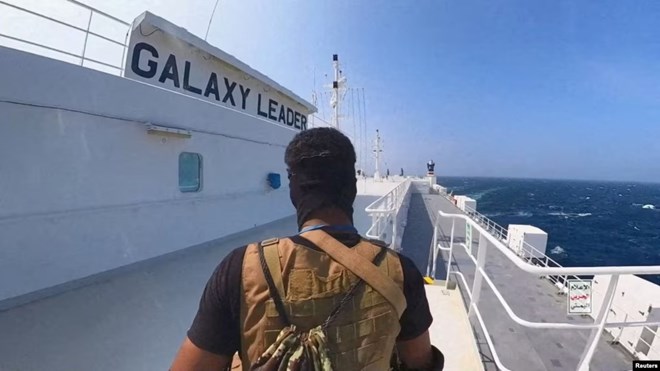
Friday January 5, 2024
By Henry Ridgewell

FILE - A Houthi fighter stands on the Galaxy Leader cargo ship in the Red Sea in this photo released Nov. 20, 2023. (Houthi Military Media/Handout via Reuters)
LONDON — Freight costs from Asia to northern Europe have more than doubled in recent days as attacks by Houthi rebels on commercial vessels in the Red Sea force shipping companies to re-route cargo around the southern tip of Africa.
The Iranian-backed militants have staged at least 24 attacks on commercial vessels since mid-November, according to the International Maritime Organization. The group, which has been engaged in a civil war with Yemen’s internationally recognized government since 2014, claims to target Israeli-linked vessels in support of Palestinians in Gaza, although several ships with no links to Israel have been attacked.
The Bahamian-flagged vehicle carrier Galaxy Leader and its crew, which the militants have held since seizing it November 19, belongs to a company partly owned by Israeli businessman Rami Ungar.
Rerouting
"Trade [through the Red Sea] is down by about a third. But most of that is container ships. That is the high value goods that are going from Asia through to Europe. Very few vehicle carriers are going through,” Wiese Bockmann told VOA. “Oil transits of tankers, especially Russian crude — say, from [northwestern] Russia to India and China — is virtually uninterrupted."
US-led operation
Late last month the United States launched Operation Prosperity Guardian, an international maritime security force aimed at countering the Houthi attacks. The U.S. says 20 countries are taking part, but there are doubts over its efficacy, said Wiese Bockmann.
"The fact that container lines are not transiting shows that they have very little confidence in the in the ability of this U.S.-led coalition to be able to make those traffic lanes safer," she said.
UN response
The U.N. Security Council held a meeting on the attacks Wednesday, amid warnings that global food security is at risk.
"Continued Houthi threats to maritime navigation coupled with the risk of further military escalation remains of serious concern and could potentially impact millions in Yemen, the region and globally," said Khaled Khiari, the U.N.’s assistant secretary-general for Middle East, Asia and the Pacific, in the departments of political and peace-building affairs and peace operations.
Iran accusations
The United States’ representative at the meeting singled out Iran for supporting the Houthis.
"Iran has long enabled these attacks by the Houthis,” said Chris Lu, U.S. ambassador to the U.N. for management and reform. “Beyond Iran's long-standing provision of financing to aid such Houthi operations, since 2015, it has transferred advanced weapons systems to the Houthis, including unmanned aerial systems, land attack cruise missiles and ballistic missiles used in attacks against maritime vessels.”
Houthi military spokesman Brigadier Yahya Saree delivers a statement on attacks against commercial vessels in the Red Sea during a march in solidarity with the people of Gaza in the Yemeni capital of Sanaa on Dec. 15, 2023.
Tehran denies supporting the Houthi attacks in the Red Sea.
Unprecedented threat
The level of threat faced by commercial vessels in the region is unprecedented.
"The last time we had interruptions in that area was for Somali piracy more than a decade ago, and you're dealing with Somalis on skiffs with AK-47s, trying to board and hijack vessels," analyst Wiese Bockmann told VOA.
"What we're now dealing with is a force that has ballistic missiles and drones and a far greater reach and more targeted information about the vessels they want,” she said.
“Make no mistake, I think the Houthis know exactly what they're doing by targeting commercial shipping, because it's getting their headlines and generating the concern amongst world leaders that they want for their aims and ambitions to highlight their opposition to the war in Gaza."